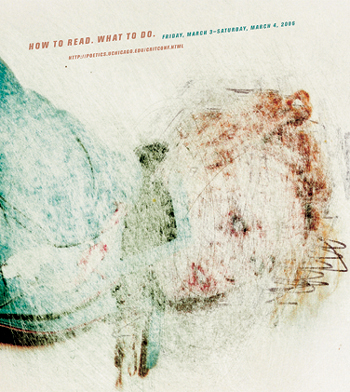Young poets will critique process of reading poetry to bring more poems to people
By Jennifer CarnigNews Office
 | |
Can the work of Gertrude Stein and William Shakespeare carry on a conversation? What about those of Rumi and Zukofsky? Though these writers come from different times, cultures, languages and geographies, many readers view their poems as though they are part of a single tradition.
As it turns out, some poetry critics do, too.
In the upcoming conference, “How to Read. What to Do: The Future of Poetry Criticism,” taking place at the University on Friday, March 3 and Saturday, March 4, a group of young poetry critics, known for their distinguished and interesting work, will gather to discuss what poetry criticism is and examine the practical intuition that “poetry is a whole.”
The conference brings together critics from the University, including Mark Payne, Assistant Professor in Classics; Jennifer Scappettone, Assistant Professor in English Language & Literature; and Oren Izenberg, Assistant Professor in English Language & Literature, with their counterparts at the University of Illinois at Chicago, Stanford University, Macalester College, Princeton University, Harvard University and New York University.
The nine critics all take different approaches to different moments—romantic and Renaissance to modernist and contemporary— but they all see a connecting vein running through their subject matters, said Izenberg, who convened the conference.
“Is that a kind of mistake, or just a habit?” Izenberg asks. “Or is there some ground there, a rationale for treating poems in that way?”
The conversation is an important topic, Izenberg said, because the younger generation of poetry critics is working in an undefined moment. There is currently no dominant method that critics use to investigate poems, a marked change from the last generation of critics that more-or-less routinely looked at poems under a historicist microscope.
The historicist project of asking what a work of art can tell you about the culture from which it emerged in many ways seems counterintuitive to the way people read poems. “Readers understand themselves to be interested in poems ‘as poems,’” Izenberg said, rather than as artifacts from a past time.
“The conference is gathering together critics to make conscious sense of our common-sense practices of reading,” he said. “For example, one question that poetry lovers truly ask is, ‘What is it that moves us?’”
Izenberg explained that the conference should be accessible to anyone who loves the art form of poetry. “Part of the goal of the conference is to make our ways of thinking and talking about poetry less exclusively the property of the university,” he said.
“Poetry doesn’t just belong to specialists, so we want to open up our ways of thinking and our language in a way that makes it more available.”
Half of the professors presenting also are active poets themselves, so the conference will begin with a reading by four of the presenters at 5 p.m. Friday, March 3, at the Smart Museum of Art, 5550 S. Greenwood Ave.
The conference continues with discussions and paper presentations from 9 a.m. to 6 p.m. Saturday, March 4, at the Franke Institute for the Humanities, 1100 E. 57th St.
Electronic copies of the conference papers, to be read in advance, can be downloaded from http://poetics.uchicago.edu/critconf.html. Paper copies can be picked up from Room 411, Walker Museum, 1115 E. 58th St.
Both days of the conference are free and open to the public. For more information, call (773) 834-8524 or e-mail jnklein@uchicago.edu.
![[Chronicle]](/images/sidebar_header_oct06.gif)